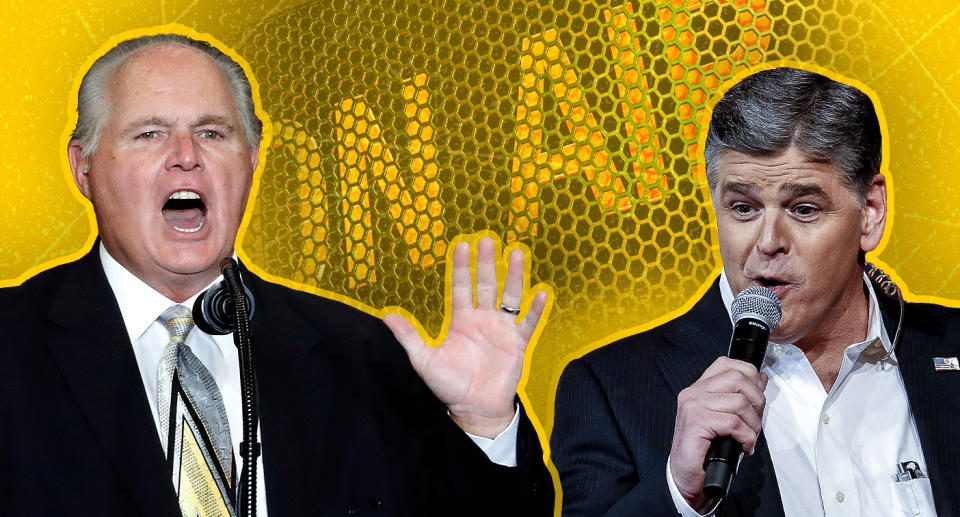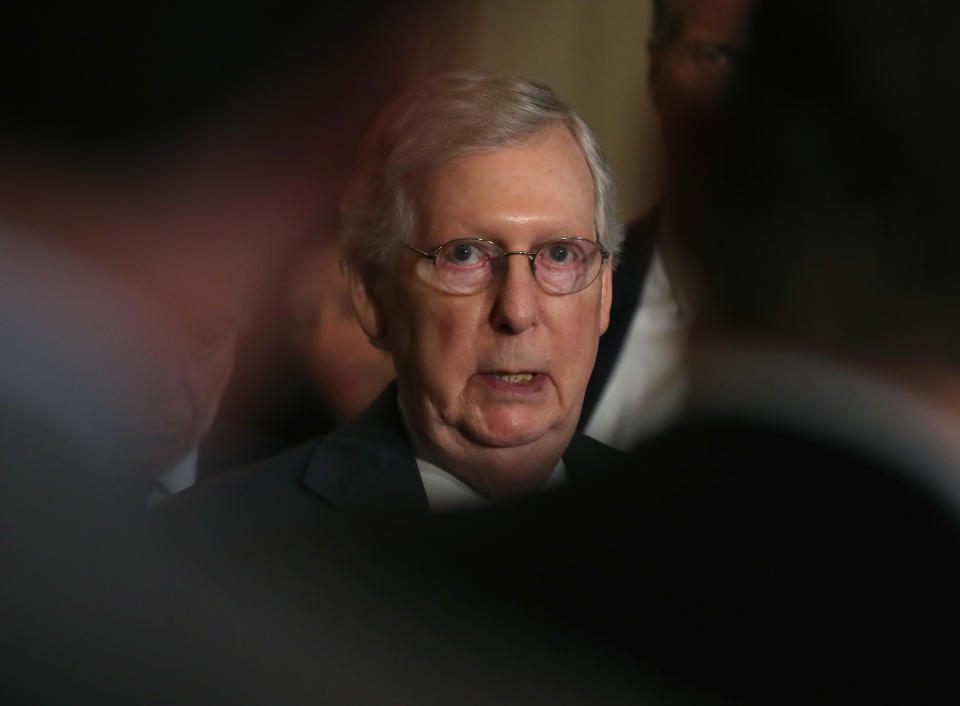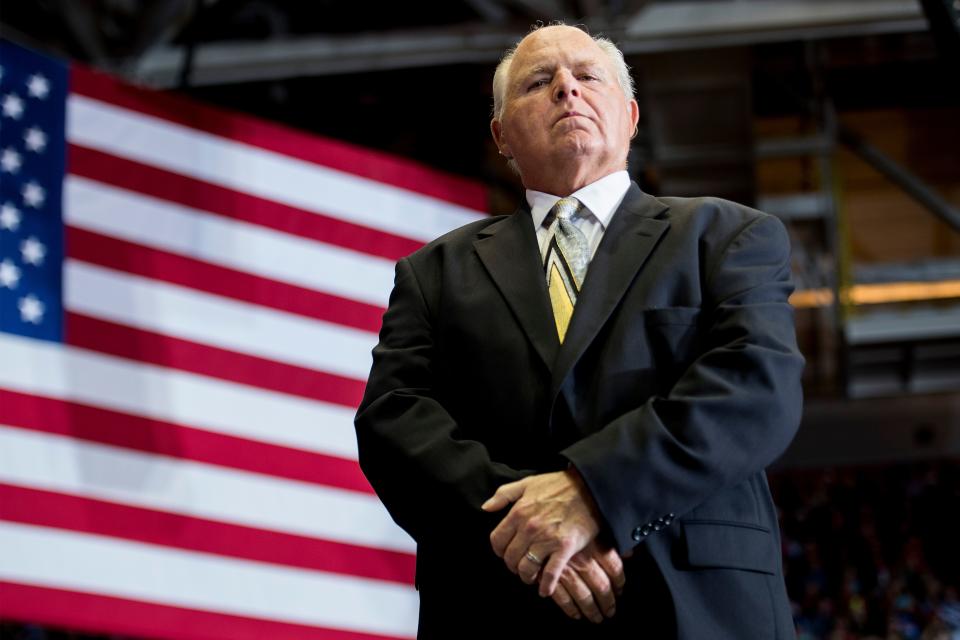Limbaugh and Hannity are 'party leaders' just as much as McConnell, new book argues
To many Republican voters, Senate Majority Leader Mitch McConnell is an establishment hack who can’t be trusted, while Fox News’ Sean Hannity is a straight talker who keeps the GOP honest.
Hannity’s elevated stature reflects a trend that has made increasing numbers of Americans on the left and right scornful of political parties and establishment leaders, and place more stock in the words of figures they consider to be outsider critics, such as cable TV news personalities or talk radio hosts.
But the author of a new book on the history of talk radio says that modern media figures like Hannity are just as much party leaders as more conventional figures like McConnell, with one key difference: They are far less accountable than party bosses used to be.

“The reason I say they’re still party leaders is, first of all, because they wield enormous influence with primary voters in determining who nominees are and in setting the constraints as to where Republicans can be policy-wise. But they’re also doing things that traditional party leaders did, like hosting fundraisers, MC’ing rallies, bringing on candidates to excite volunteers or to get name recognition,” said Brian Rosenwald, author of “Talk Radio’s America: How an Industry Took Over a Political Party That Took Over the United States.”
“They’re doing a lot of what traditional party leaders did, but they’re doing it from this different perspective … with these different priorities,” Rosenwald said in an interview on the Yahoo News podcast “The Long Game.”
Rosenwald’s book marks the birth of talk radio at 1988, when Rush Limbaugh burst onto the scene at a time when many AM radio stations were desperate for a way to survive the rise of FM radio.

Talk radio filled a vacuum created by the gradual decline of political parties, which lost significant power in the 1970s and ’80s with the introduction of primary elections. Previously, party bosses and leaders controlled who received the nomination of their party for president and lower offices.
Changes to campaign finance law in the early 2000s further weakened party power.
Talk radio has played a major role even in the last few years as the media landscape has changed at a rapid pace. In 2013, local and national talk radio hosts on the right played a big role in killing the push for comprehensive immigration reform, Rosenwald says. And a big part of former House Speaker Paul Ryan’s media outreach plan after he took over in 2015 was to do regular call-in interviews with popular national hosts and on shows in his home state of Wisconsin.
Hannity appeared onstage with President Trump last fall at a rally in Missouri, openly supporting Trump and the Republican Party’s candidates in the midterm elections. Limbaugh spoke at the same rally and introduced Trump.
It can be hard to document the influence of talk radio over time, Rosenwald said, because there is so much of it and because most shows do not archive their content.
The biggest difference between a traditional party leader and a talk radio or cable TV host, Rosenwald said, is that their incentives, priorities and goals are very different. A conventional party leader like McConnell thinks about how to pass legislation through the lens of what is possible inside the constraints of Congress.

“That’s a very different calculation from talk radio,” Rosenwald said. “Talk radio hosts wake up in the morning and say — and this goes for cable news hosts as well — they wake up and say, ‘What’s the best show I can put on today?’”
The chief goal, then, for talk radio and cable TV is to entertain, in order to keep listeners and watchers from changing the channel. This distorts their presentation of the news, Rosenwald said, and leads to an oversimplified and reductionist portrayal of events.
“If you say, ‘We’ve got to cut a deal to raise the debt ceiling because there’s going to be serious economic consequences if we don’t do this, and you may not like it, it may not come with the things we want, but there’s divided government and the system works this way’ — I just bored your audience even trying to talk about that,” Rosenwald said.
“And that may be practical and important from a political standpoint, but it’s bad radio or bad television. Whereas saying, ‘These people sold out your values and they’re surrendering and, God, if they just stood up and fought for you, you wouldn’t feel like our values are under siege’ — that’s much better content. So the incentive structure is pushing them in that direction,” he said.

And all this takes place at a time when these radio and TV personalities have gained a powerful role in shaping the perceptions of millions of Americans, and now have as much political power as traditional party leaders, if not more, Rosenwald argues.
A cable TV insider, speaking on the condition they not be identified, recently told Yahoo News that an interview on MSNBC’s “Rachel Maddow Show” is considerably more valuable to a Democratic presidential candidate than a meeting with Tom Perez, chairman of the Democratic National Committee.
Swapping out establishment politicians in exchange for entertainer leaders has disfigured modern American politics and has entrenched political gridlock, Rosenwald said.
As he concludes in his book: “Talk radio invited alienated conservative Americans into the political process … [but it] also damaged the functioning of government — and democracy.”
_____
Download the Yahoo News app to customize your experience.
Read more from Yahoo News:
Document reveals the FBI is tracking border protest groups as extremist organizations
How Atlanta's mayor turned her famous father's arrest into a passion for criminal justice reform
Felix Sater: Trump wanted to reveal my secret CIA, FBI work during the campaign
PHOTOS: Stunning images capture the relationship between man and elephant



